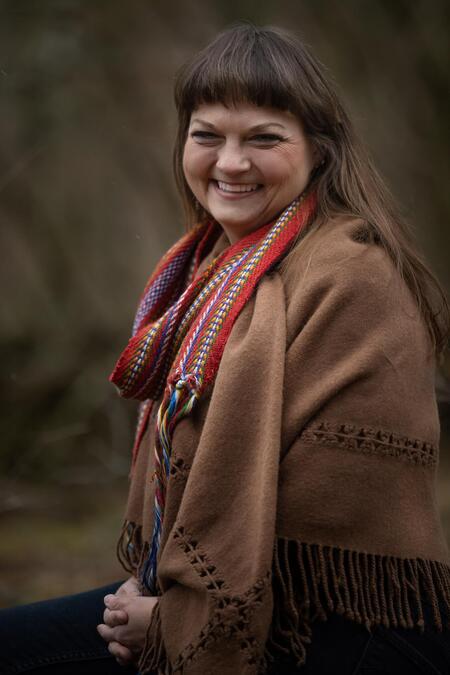Funded and led by Queen’s Partnerships and Innovation, the WE-CAN Project inspires and empowers existing and aspiring women-identifying entrepreneurs by providing them with tools, resources, expert mentors, networks and community building to expand existing businesses and to launch new ventures.
Over the past three years, the WE-CAN Project has served 130 Indigenous women entrepreneurs, 90 of whom received services through the Kwe-Biz Program as part of the Women Entrepreneurship Strategy (WES) Ecosystem funding provided to Queen’s University by the Federal Economic Development Agency for Southern Ontario.
Delivered by Indigenous business leaders and entrepreneurs Shyra and Rye Barberstock, the Kwe-Biz Program provided convenient access to the Kwe-Biz Accelerator, dozens of culturally intuitive workshops, and one-on-one mentorship sessions delivered from an Indigenous perspective.
“We have seen some great success stories and have been proud of the growth of our Kwe-Biz clients,” shares Shyra Barberstock, President and Co-founder of Okwaho Equal Source (OES) based on Tyendinaga Mohawk Territory. “Out of all our projects since starting our company in 2014, the Kwe-Biz Program has been our favourite due to the relationships that have been developed and the positive social impacts.”
The anchor program has been the Kwe-Biz Accelerator where Indigenous women have participated in a group cohort with Shyra and Rye facilitating discussions and providing hands-on training.
“Each of the three Accelerators we delivered was slightly different from the others, depending on who was participating,” Shyra explains. “In one cohort, we had a group of women who were keen to learn how to develop their own web sites, so that became the focus. The purpose of the Kwe-Biz Accelerator has been to move our clients beyond the barriers they’re facing and help them achieve significant progress in their business.”
Each of the three Accelerators was followed up with a culturally sensitive workshop series. Based on the questions raised during the Accelerator, each workshop series also developed its own focus, with topics ranging from branding to exporting.
During the second workshop series, the need for an Indigenous Women’s Writing Circle emerged. In response, OES adjusted the Kwe-Biz program to include separate sessions for established and emerging writers.
Pamela Devonshire of Lightning Spark Books is one of the women who took part in the Kwe-Biz Women’s Writing Circle. An author and storyteller with Mohawk, British, and Scottish ancestry, Devonshire is a proud member of the Mohawks of the Bay of Quinte.
During the pandemic, Devonshire created a series of children’s books spotlighting significant Indigenous people, events, and folklore. Her goal has been to share these stories and educate the general public in an interesting and compelling way.
Prior to joining Kwe-Biz, Devonshire had plenty of passion and ideas for sharing Indigenous stories, but no supports to help her make them happen. In particular, she was struggling with where to get her stories printed and how to create a professional layout for her books.
"Kwe-Biz was instrumental in helping me to start my business,” says Devonshire. “Shyra and Rye were there for me every step of the way on this incredible journey. Their mentorship program also helped me hone and improve my public speaking skills for events such as Pow Wow Pitch and Kwe Biz's pitching and business plan competitions."
She adds, “Kwe-Biz also helped me establish a business and marketing plan. I met with Shyra and Rye on a bi-weekly basis for several months, and this ongoing support helped to keep me on track to meet the various milestones of the initiative.”
One notable feature of the Kwe-Biz Workshop Series has been its flexibility in offering cohort programming at times that were most convenient for its clients.

“Each Kwe-Biz workshop was packed with knowledge, resources, and support while being offered at ideal online times such as evenings as some of us business owners also work day jobs,” observes Kwe-Biz client Maureen Shemrock, owner of Ombaashi Applied Technologies on Tyendinaga Mohawk Territory.
Flowing out of the workshop series, the opportunity for one-on-one coaching from an Indigenous perspective was also a vital part of the Kwe-Biz Program’s success and proved to be a natural complement to the Accelerator discussions and workshops sessions.
“Working with our clients one-on-one allowed us to pinpoint their needs and help them work through their struggles,” Rye shares.
“Kwe-Biz has made a huge difference for me,” acknowledges Candace Lloyd, founder of Nookoom Learning in Napanee, Ontario. “The facilitators teach with a traditional knowledge-sharing approach and that’s what has helped me move forward in my business step-by-step. They answer my questions and have mentored me when I’m facing specific challenges. They follow up, because they really care. Before my Kwe-Biz mentorship, I was giving away my time and knowledge for free. While I still love to volunteer, I also recognize that my time and knowledge have value. Kwe-Biz has given me the confidence as an Indigenous woman and a traditional knowledge holder to recognize the worth of the services I offer. I went from not knowing what I was capable of doing to realizing I have a great business and the skills to build the foundation for a strong future.”
While the Kwe-Biz Program ended on March 31, 2023, as planned with the conclusion of the WES funding to Queen’s, the WE-CAN Project is honoured to serve Indigenous women entrepreneurs as a part of its continued programs and services for women entrepreneurs in the Kingston and Quinte area.
To learn more about the WE-CAN Project, visit the WE-CAN page on the QPI website.
 About Vice-Principal Research
About Vice-Principal Research